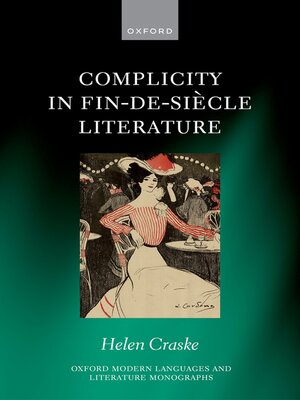Complicity in Fin-de-Siecle Literature
ebook ∣ Oxford Modern Languages and Literature Monographs
By Helen Craske

Sign up to save your library
With an OverDrive account, you can save your favorite libraries for at-a-glance information about availability. Find out more about OverDrive accounts.
Find this title in Libby, the library reading app by OverDrive.



Search for a digital library with this title
Title found at these libraries:
| Library Name | Distance |
|---|---|
| Loading... |
Complicity in Fin-de-siècle Literature examines late-nineteenth century French understandings of literature as a morally collusive medium, which implicates readers, writers, and critics in risqué or illicit ideas and behaviour. It considers definitions of complicity from the period's evolving legal statutes, critical debates about literary 'bad influence', and modern theories of reader response, in order to achieve a deeper understanding of how cultural production of the period forged relationships of implication and collusion. While focusing on fin-de-siècle French culture, the book's theoretical discussions provide a new terminology and conceptual framework through which to analyse literary influence and reception, applicable to different historical periods and national settings. Interdisciplinary in nature, the study draws on methods associated with close reading, literary history, law and literature studies, cultural studies, and sociology of literature. Each of the book's chapters highlights how particular literary themes or techniques encouraged readers' identification with transgression and facilitated alternative forms of solidarity. The analysis draws on a range of case studies from different media forms, including: Naturalist, Decadent, and psychological novels, biographically revealing fiction ('romans à clef'), little magazines ('petites revues'), and saucy magazines ('revues légères'). Texts written by well-known literary figures—such as Émile Zola, Octave Mirbeau, and Rachilde—appear alongside previously overlooked periodical and archival sources. The book's varied corpus reveals the widespread appeal of risqué topics and illicit solidarity across the literary spectrum.







